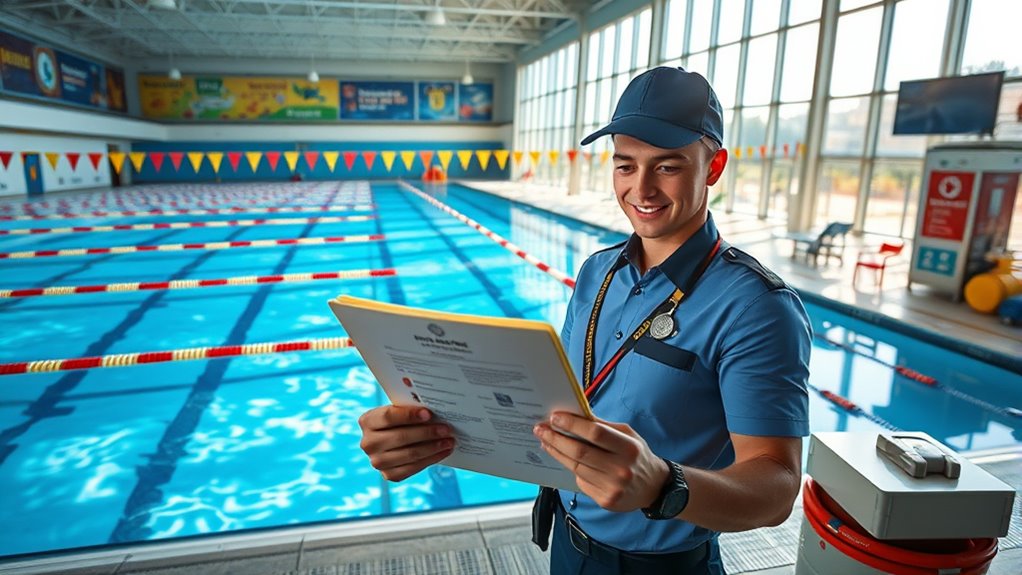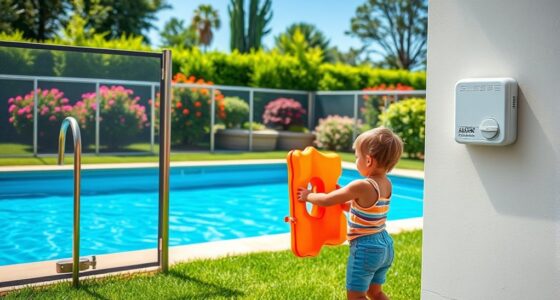As a commercial pool operator, you should consider extensive liability coverage to protect against injuries, property damage, and legal expenses. It’s important to review policy exclusions related to natural disasters, equipment, and specific activities like diving. Working with insurance professionals helps customize your plans and fill coverage gaps. Understanding these options and exclusions ensures your business remains secure. Continue exploring these strategies to maximize your protection and stay prepared for potential risks.
Key Takeaways
- Commercial pool operators should consider comprehensive liability insurance to protect against guest injuries and property damage.
- Review policy exclusions carefully, especially for natural disasters or specific activities like diving or chemical handling.
- Work with insurance brokers experienced in aquatic industry risks to customize coverage and identify gaps.
- Ensure coverage includes equipment-related risks and activities to prevent unexpected claim denials.
- Implement risk management strategies and wellness initiatives to reduce liability and strengthen insurance protection.

Are you a commercial pool operator wondering how to protect your business from potential risks? It’s essential to have the right insurance coverage in place to safeguard your operations, reputation, and financial stability. One of the most critical components of your insurance plan is liability coverage. This coverage helps shield you if someone gets injured on your property or if property damage occurs due to your operations. For instance, if a guest slips and falls, liability coverage can help cover medical expenses and legal costs if they decide to sue. Without it, you could be left footing hefty bills that threaten your business’s survival.
However, it’s equally important to understand policy exclusions. Insurance policies don’t cover everything, and exclusions are specific situations or damages that the policy explicitly excludes from coverage. For example, some policies might exclude coverage for damages resulting from certain natural disasters or intentional acts. As a pool operator, you should carefully review your policy to understand what’s excluded. Knowing these gaps helps you plan better, whether that’s by purchasing additional coverage or implementing safety measures to prevent claims that fall outside your policy.
Understanding policy exclusions helps pool operators plan and protect against uncovered risks effectively.
Many policies also exclude coverage for certain types of equipment or specific activities. For example, if you operate a pool with diving boards, some policies might exclude coverage for injuries caused by diving accidents. Similarly, if you’re involved in pool maintenance or chemical handling, certain incidents related to those activities might be excluded unless you’ve specifically added coverage. It’s vital to read the fine print and ask your insurance provider questions to clarify what’s covered and what isn’t. This way, you won’t be caught off guard in a claim situation and can take proactive steps to fill any gaps.
Additionally, understanding the benefits of cold-pressed vegetable juice and other health-related topics can help you promote wellness in your community, which may indirectly reduce liability risks by encouraging safe and healthy practices. Balancing liability coverage with an understanding of policy exclusions isn’t just about compliance; it’s about peace of mind. You want to ensure that your insurance policy aligns with your specific risks and operational activities. Working with an insurance broker familiar with the aquatic industry can help you customize a policy that offers robust protection while clearly outlining what’s excluded. Remember, having comprehensive liability coverage and understanding your policy’s exclusions can save you from significant financial losses and legal headaches down the line. Protecting your business starts with informed decisions, and knowing what your policy covers—and what it doesn’t—is a crucial first step.
Frequently Asked Questions
What Is the Typical Cost of Commercial Pool Insurance?
You can expect commercial pool insurance to cost between $1,000 and $3,000 annually, depending on liability limits and the size of your pool. Premium rates vary based on factors like coverage amount, location, and risk assessment. Higher liability limits typically increase your premium, but they provide better protection. To find the best rate, compare quotes from insurers and consider your specific coverage needs to balance cost and security effectively.
Are There Specific Policies for Outdoor Versus Indoor Pools?
Yes, there are specific policies for outdoor versus indoor pools. Indoor considerations often include coverage for humidity, mold, and ventilation issues, while outdoor nuances focus on weather-related risks like storms, wind damage, and sun exposure. You should tailor your policy to address these unique risks, ensuring thorough protection. Consulting with an insurer familiar with both indoor and outdoor pool risks helps you choose the right coverage for your specific facility.
How Does Coverage Differ Between Small and Large Commercial Pools?
Think of your pool as a mighty river, where small and large pools face different storms. For small pools, liability coverage and equipment protection come at a lower tide, offering essential safety without overwhelming costs. Large pools, like vast lakes, require broader coverage to shield against bigger risks—more extensive liability coverage and equipment protection. You need tailored policies that match your pool’s size, ensuring you’re prepared for any sudden splash or storm.
What Safety Equipment Is Required for Insurance Eligibility?
You need to make certain your pool meets safety standards like proper fencing, lifesaving equipment, and clearly visible signage to qualify for insurance. Having these safety measures reduces liability coverage risks and demonstrates your commitment to safety. Insurance providers look for compliance with local regulations and safety protocols, so maintaining updated safety equipment like rescue hooks, life rings, and first aid kits is essential for coverage eligibility and protecting your business.
Can Existing Policies Be Customized for Unique Pool Features?
You can definitely customize your existing policy to accommodate unique pool features. Policy customization allows you to tailor coverage to your specific needs, especially if you’ve made pool feature modifications that standard policies don’t cover. Don’t just settle for off-the-shelf plans; work closely with your insurer to make sure your policy reflects your pool’s unique aspects. This way, you won’t be caught flat-footed when unexpected issues arise.
Conclusion
As a commercial pool operator, having the right insurance isn’t just smart—it’s essential. Did you know that slips and falls account for over 20% of all injury claims in recreational facilities? Protect your business, staff, and visitors by choosing extensive coverage. Staying insured gives you peace of mind and helps you navigate unexpected incidents confidently. Don’t leave your pool’s safety to chance—invest in the right insurance today and keep your operations secure.









